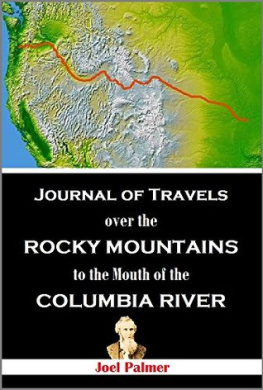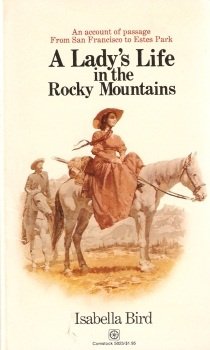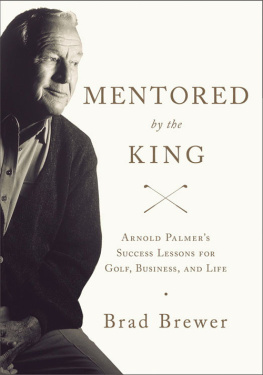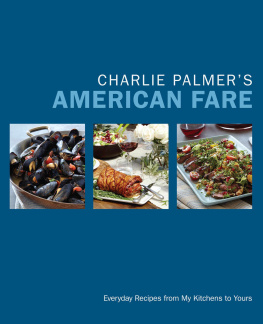Joel Palmer - Palmers Journal of Travels Over the Rocky Mountains, 1845-1846
Here you can read online Joel Palmer - Palmers Journal of Travels Over the Rocky Mountains, 1845-1846 full text of the book (entire story) in english for free. Download pdf and epub, get meaning, cover and reviews about this ebook. year: 2021, publisher: Good Press, genre: Home and family. Description of the work, (preface) as well as reviews are available. Best literature library LitArk.com created for fans of good reading and offers a wide selection of genres:
Romance novel
Science fiction
Adventure
Detective
Science
History
Home and family
Prose
Art
Politics
Computer
Non-fiction
Religion
Business
Children
Humor
Choose a favorite category and find really read worthwhile books. Enjoy immersion in the world of imagination, feel the emotions of the characters or learn something new for yourself, make an fascinating discovery.

- Book:Palmers Journal of Travels Over the Rocky Mountains, 1845-1846
- Author:
- Publisher:Good Press
- Genre:
- Year:2021
- Rating:5 / 5
- Favourites:Add to favourites
- Your mark:
- 100
- 1
- 2
- 3
- 4
- 5
Palmers Journal of Travels Over the Rocky Mountains, 1845-1846: summary, description and annotation
We offer to read an annotation, description, summary or preface (depends on what the author of the book "Palmers Journal of Travels Over the Rocky Mountains, 1845-1846" wrote himself). If you haven't found the necessary information about the book — write in the comments, we will try to find it.
Joel Palmer: author's other books
Who wrote Palmers Journal of Travels Over the Rocky Mountains, 1845-1846? Find out the surname, the name of the author of the book and a list of all author's works by series.
Palmers Journal of Travels Over the Rocky Mountains, 1845-1846 — read online for free the complete book (whole text) full work
Below is the text of the book, divided by pages. System saving the place of the last page read, allows you to conveniently read the book "Palmers Journal of Travels Over the Rocky Mountains, 1845-1846" online for free, without having to search again every time where you left off. Put a bookmark, and you can go to the page where you finished reading at any time.
Font size:
Interval:
Bookmark:
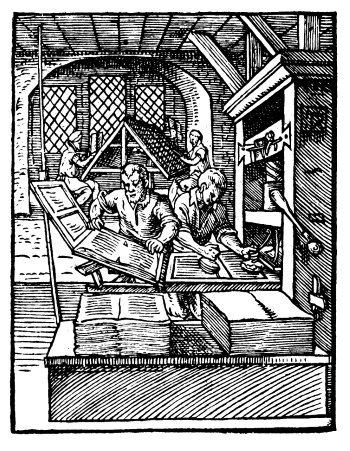
1748-1846
Volume XXX
Early Western Travels
1748-1846
A Series of Annotated Reprints of some of the best
and rarest contemporary volumes of travel, descriptive
of the Aborigines and Social and
Economic Conditions in the Middle
and Far West, during the Period
of Early American Settlement
Edited with Notes, Introductions, Index, etc., by
Reuben Gold Thwaites, LL.D.
Editor of "The Jesuit Relations and Allied Documents," "Original
Journals of the Lewis and Clark Expedition," "Hennepin's
New Discovery," etc.
Volume XXX
Palmer's Journal of Travels over the Rocky Mountains,
1845-1846

Cleveland, Ohio
The Arthur H. Clark Company
1906
THE ARTHUR H. CLARK COMPANY
ALL RIGHTS RESERVED
The Lakeside Press
R. R. DONNELLEY & SONS COMPANY
CHICAGO
| Preface. The Editor |
| Journal of Travels over the Rocky Mountains, to the Mouth of the Columbia River; Made during the Years 1845 and 1846 : containing minute descriptions of the Valleys of the Willamette, Umpqua, and Clamet; a general description of Oregon Territory; its inhabitants, climate, soil, productions, etc., etc.; a list of Necessary Outfits for Emigrants; and a Table of Distances from Camp to Camp on the Route. Also; A Letter from the Rev. H. H. Spalding, resident Missionary, for the last ten years, among the Nez Perc Tribe of Indians, on the Kooskooskee River; The Organic Laws of Oregon Territory; Tables of about 300 words of the Chinook Jargon, and about 200 Words of the Nez Perc Language; a Description of Mount Hood; Incidents of Travel, &c., &c. Joel Palmer. |
| Copyright Notice |
| Author's Dedication |
| Publishers' Advertisement |
| Text: Journal, April 16, 1845-July 23, 1846 |
| Necessary Outfits for Emigrants traveling to Oregon |
| Words used in the Chinook Jargon |
| Words used in the Nez Perc Language |
| Table of Distances from Independence, Missouri; and St. Joseph, to Oregon City, in Oregon Territory |
| Appendix: |
| Letter of the Rev. H. H. Spalding to Joel Palmer, Oregon Territory, April 7, 1846 |
| Organic Laws of Oregon (with amendments). |
| Facsimile of title-page, Palmer's Journal of Travels. |
In the wake of the pathfinders, fur-traders, Indian scouts, missionaries, scientific visitors, and foreign adventurers came the ultimate figure among early Western travellers, the American pioneer settler, the fore-runner of the forces of occupation and civilization. This concluding volume in our series is, therefore, fitly devoted to the record of an actual home-seeker, and founder of new Western communities.
The significant feature of American history has been the transplanting of bodies of colonists from one frontier to a newer frontier. In respect to the Oregon country, our interest therein is enhanced not only by the great distance and the abundant perils of the way, but also by the political result in securing the territory to the United States, and the growth of a prosperous commonwealth in the Far Northwest corner of our broad domain. In several previous volumes of our series we have witnessed the beginnings of Oregon civilization. Two of our travellers, Franchre and Ross, have graphically detailed the Astoria episode, giving us, not without some literary skill, the skeleton of facts which Irving's masterful pen clothed with living flesh and healthful color; in Townsend's pages we found an enduring picture of the rgime of the all-powerful Hudson's Bay Company; De Smet, with faithful, indeed loving, touches has portrayed the vanishing aborigines, whose sad story has yet fully to be toldeventually, when the last vestige of their race has gone, we shall come to recognize the tale as the sorriest chapter in our annals; Farnham shrewdly narrates the sharp transition to American occupancy; but Palmer tells us of the triumphant progress of the conquering pioneer, and in his pages the destiny of Oregon as an American state is clearly foreshadowed.
"Fifty-four forty, or fight," the belligerent slogan with regard to Oregon, adopted in the presidential campaign of 1844, was after all not so much a notice to the British government that the United States considered the Oregon country her own, beyond recall, as an appeal to the pioneers of the West to secure this vast inheritance by actual occupation. As such it proved a trumpet call to thousands of vigorous American farmers, most of them already possessed of comfortable homes in the growing communities of the Middle West.
"I have an uncle," declared one of the pioneers to Dr. John McLoughlin, Hudson's Bay factor on the Pacific coast, "who is rich enough to buy out your company and all this territory."
"Indeed!" replied the doctor, courteously, "who is he?"
"Uncle Sam," gayly responded the emigrant, with huge enjoyment in his well-worn witticism. It was at the supposed behest of this same "Uncle Sam" that farms were sold, wagons and oxen purchased, outfits prepared, and long caravans of permanent settlers slowly and painfully crossed the vast plains and rugged mountains lying between the comfortable settlements of the "Old Northwest"the "Middle West" of our dayand the new land of promise in the Far Northwest of the Pacific Slope.
The emigration of 1845 exceeded all that had gone before. That of 1843, eight hundred strong, had startled the Indians, and surprised the staid officials of the Hudson's Bay Company. That of 1844 had occupied the fertile valleys from Puget Sound on the north to Calapooia on the south. That of 1845 determined that the territory should be the home of Americans; it doubled the population already on the ground, reinforced the compact form of government, and laid broad and deep the foundations of new American commonwealths.
Our author, Joel Palmer, a shrewd, genial farmer from Indiana, was a leader among these emigrants of 1845. Born across the Canada line in 1810, he nevertheless was of New York parentage, and American to the core. In early life his family removed to Indiana, where Joel founded a home at Laurel, in northwest Franklin County. By the suffrages of his neighbors Palmer was sent to the state legislature in 1844, but the following year determined to make a tour to Oregon for personal observation, before deciding to remove his family thither and cast his future lot with its pioneer settlers. Arrived on the Missouri frontier, he found that the usual wagon train had gone in advance. However, he overtook the great body of the emigrants in time to assist in the organization of the caravan on Big Soldier's Creek, in Kansas.
Gathered from all parts of the Middle West, with no attempt at organization nor any pre-arrangement whatsoever, the emigrants, who had not yet forgotten the frontier traditions of their fathers, proved to be a homogeneous body of about three thousand alert, capable travellers, provided in general with necessities and even comforts for the hardships of the long journey; indeed, after the manner of their Aryan forbears in the great westerly migrations of the past, they were accompanied by herds of cattle, to form the basis of agricultural life in the new land. Each of the several hundred wagons was a travelling house, provided with tents, beds, and cooking utensils; clothing and food were also carried, sufficient not only for the journey out, but for subsistence through the first year, always the crucial stage of agricultural pioneering. The draught cattle were largely oxen, but many of the men rode horses, and others drove them with their cows and bulls.
Font size:
Interval:
Bookmark:
Similar books «Palmers Journal of Travels Over the Rocky Mountains, 1845-1846»
Look at similar books to Palmers Journal of Travels Over the Rocky Mountains, 1845-1846. We have selected literature similar in name and meaning in the hope of providing readers with more options to find new, interesting, not yet read works.
Discussion, reviews of the book Palmers Journal of Travels Over the Rocky Mountains, 1845-1846 and just readers' own opinions. Leave your comments, write what you think about the work, its meaning or the main characters. Specify what exactly you liked and what you didn't like, and why you think so.

